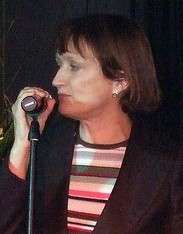Shadow Minister for Women and Equalities
| Shadow Minister for Women and Equalities | |
|---|---|
| Appointer | Leader of the Opposition |
| Website | The Shadow Cabinet |
The Shadow Minister for Women and Equalities (previously Shadow Minister for Women and Shadow Minister for Women and Equality) is a position in the United Kingdom's Official Opposition, often held together with a Shadow Cabinet post, but sometimes as a Shadow Cabinet post in its own right. The Shadow Minister is responsible for holding the Minister for Women and Equalities, responsible for the Government Equalities Office, to account and is responsible for Opposition policy on women's and equality issues.
Shadow Ministers
| Shadow Minister | Took office | Left office | Political party | Leader of the Opposition | ||
|---|---|---|---|---|---|---|
| Jo Richardson | 31 October 1983[1] | 18 July 1992 | Labour | Neil Kinnock | ||
| Mo Mowlam | 18 July 1992[2] | 21 October 1993 | Labour | John Smith | ||
| Clare Short |  |
21 October 1993[3] | 19 October 1995 | Labour | ||
| Tony Blair | ||||||
| Tessa Jowell |  |
19 October 1995[4] | 26 July 1996[n 1] | Labour | ||
| Janet Anderson | 26 July 1996[n 1] | 2 May 1997 | Labour | |||
| Gillian Shephard | 2 May 1997 | Unknown | Conservative | John Major | ||
| Unclear[n 2] | Conservative | William Hague | ||||
| Theresa May |  |
15 June 1999 | 14 September 2001 | Conservative | ||
| Caroline Spelman |  |
14 September 2001 | 15 March 2004 | Conservative | Iain Duncan Smith | |
| Michael Howard | ||||||
| Eleanor Laing | 15 March 2004 | 2 July 2007 | Conservative | |||
| David Cameron | ||||||
| Theresa May |  |
2 July 2007 | 11 May 2010 | Conservative | ||
| Yvette Cooper |  |
20 May 2010 | 7 October 2013 | Labour | Harriet Harman | |
| Ed Miliband | ||||||
| Gloria De Piero |  |
7 October 2013 | 14 September 2015 | Labour | ||
| Harriet Harman | ||||||
| Kate Green |  |
14 September 2015 | 27 June 2016 | Labour | Jeremy Corbyn | |
| Angela Rayner |  |
27 June 2016 | 6 October 2016 | Labour | ||
| Sarah Champion [10] |  |
6 October 2016 | Incumbent | Labour | ||
See also
Notes
- 1 2 Blair conducted a minor reshuffle of his shadow cabinet on 26 July 1996. As Anderson was in post and Shadow Minister for Women by 21 August 1996[5] (and Jowell as a Shadow Health minister by 15 September),[6] the change likely occurred at that 26 July resuffle.
- ↑ No sources currently note any individual as holding this role for the Conservatives when Labour entered Government at the 1997 election and created the position of Minister for Women, but no source proves there was not one. Before the Conservatives' defeat, Gillian Shephard, John Major's Education Secretary, spoke on women's issues. She largely delegated the responsibility to a junior minister, Cheryl Gillan.[7] The only parliamentary debate that obviously fell under the portfolio of the Minister for Women during the term of Harriet Harman (May 1997 to July 1998) occurred on 27 February 1998. It was a set-piece debate, meaning the order of speakers was opening minister, opening shadow minister, backbenchers, closing shadow minister, closing minister. Harman opened, followed by Shepard. The closing speeches were given by Gillan for the Conservatives and Joan Ruddock, Harman's deputy, for the Government.[8] A similar debate was held on 8 March 1999. The Minister for Women was a peer, Baroness Jay of Paddington, so her deputy, Tessa Jowell, opened the debate for the Government; Theresa May opened for the Conservatives. Virginia Bottomley closed for the Opposition, and Margaret Hodge did so for Labour.[9]
References
- ↑ Parkhouse, Geoffrey (1 November 1983). "Protest by Nationalists as Dewar takes over". The Glasgow Herald. p. 7.
- ↑ Timmins, Nicholas (25 July 1992). "Smith revamps Shadow Cabinet: Nicholas Timmins analyses the Labour line-up and looks at the backgrounds of the newcomers". The Independent. Retrieved 2 June 2011.
- ↑ Lynton, Martin (22 October 1993). "Women's lists 'not illegal': The New Shadow Cabinet". The Guardian.
- ↑ Davies, Patricia Wynn; Donald Macintyre (20 October 1995). "Blair turns tables in front bench 'clearout'". The Independent. Retrieved 14 November 2013.
- ↑ Boggan, Steve; Raif, Shenai (21 August 1996). "Women in revealing clothes have no redress, says lawyer". The Independent. Retrieved 14 November 2013.
- ↑ "Letter: Nurse Search". The Independent. 15 September 1996. Retrieved 14 November 2013.
- ↑ Abrams, Fran (7 May 1997). "Jowell to be first guardian of public health". The Independent. Retrieved 14 November 2013.
- ↑ "House of Commons Debates, 27 February 1998 c. 607–80". Retrieved 14 November 2013.
- ↑ "House of Commons Debates 8 March 1999 c. 34–120". Retrieved 14 November 2013.
- ↑ "Sarah Champion takes Angela Rayner's second brief - women and equalities.". Jessica Elgot, Twitter. 6 October 2016. Retrieved 6 October 2016.
This article is issued from Wikipedia - version of the 10/6/2016. The text is available under the Creative Commons Attribution/Share Alike but additional terms may apply for the media files.